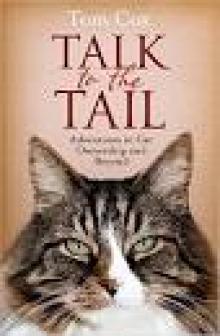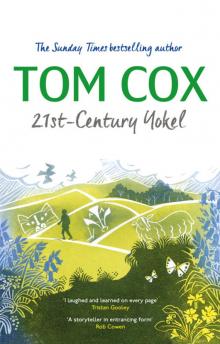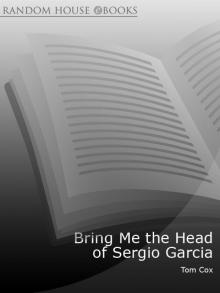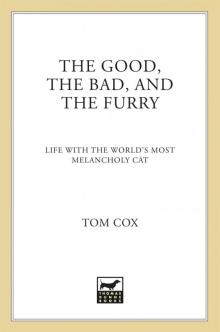21st-Century Yokel Read online
Page 5
I was glad I’d gone with my dad: it took me far out of the arguably oversafe bubble of animal lovers I normally spend time with. Also, the beginning was as explosive as he had promised, a thunder of hooves that reverberated across a dozen fields or more. Even more explosive was the moment five minutes earlier when a man had shouted ‘Loose ’orse!’ and a chestnut mare galloped through the crowd, almost trampling us, chased by two huntsmen.
‘IT WAS FOOKIN’ SPECTACULAR,’ my dad told everyone now, in the living room. ‘WE ALMOST GOT KILLED. YOU SHOULD HAVE COME. TOM DIDN’T LIKE IT AT ALL. I THOUGHT HE WAS GOING TO THROW HIMSELF IN FRONT OF ONE OF THE HORSES AS A PROTEST FOR A MOMENT, LIKE A SUFFRAGETTE. THEY’RE COMING OVER THE BACK FIELDS BY HERE IN A MINUTE. JO! GET THE CAT IN! HE’S ORANGE. THEY MIGHT MISTAKE HIM FOR A FOX.’
The conversation moved on, somehow, to owls. I told my cousin Fay about the noisy tawnies who roosted in the trees behind my house, which reminded her of the time that, upon the birth of her son, who is named Hal, a colleague of his father had sent the family a card which said, ‘Congratulations on the birth of your son, Owl!’ We talked also about Granny Pam, Fay’s dad’s mum, who nobody ever seemed to call Pam, always Granny Pam, and who lived in a high-rise flat in an area of Nottingham later to be even better known for gun crime than many other areas of Nottingham which were known for gun crime. I remember Granny Pam as a long skinny grin in a cloud of cigarette smoke, who – despite barely knowing me – always bought me amazing, imaginative Christmas presents, but Fay explained that Pam had a less-well-known vengeful side too, especially when it came to her parking space outside the flats.
‘She once got mugged and turned round and punched the mugger in the face with her keys inside her fist.’
‘Wow,’ I said.
‘Did I tell you about her lipstick?’ said Fay.
‘No,’ I said.
‘When I was a kid, if ever anyone nicked her parking space, she’d say to me, “Right! Get my lipstick!” Then we’d go outside and, while she put a chain across the space and padlocked the car in, she’d get me to write all over the car using her lipstick.’
I was keen to find out what Fay had written on the cars in question, but she didn’t get the chance to tell me, as the phone rang at this point. My dad picked it up. ‘HELLO?’ he said. ‘FOOK OFF, YOU BASTARD.’ He put the handset down and turned to us. ‘IT WAS ONE OF THOSE BASTARDS YOU GET SOMETIMES.’
Nobody was particularly surprised by this, as everyone in the room had known my dad for at least twenty-six years. He was in typically high spirits this festive season, although to be fair the season itself had little bearing on this. He’d got what he saw as the most indulgent bit of Christmas out of the way with typical alacrity on the morning of the day itself, eagerly shaking a bag next to my mum and me as we opened our presents, then packing the wrapping paper into it ready to be recycled. ‘RIGHT!’ he’d said as my mum carefully finished unwrapping the last of the usual huge mound of gifts she’d received from her friends. ‘LET’S ALL GET BACK TO WORK.’ This was standard behaviour on Christmas Day, at the dawn of which he had greeted me not with ‘MERRY CHRISTMAS’ but the bellowed instruction from his upstairs workroom: ‘THERE ARE SOME CRISPS AND MILK IN THE FRIDGE IF YOU WANT ANY!’ Boxing Day or one of the days immediately following it, such as today, was the time we reserved for getting together with the rest of the family. There’s not a lot of us, and this gathering was a particularly quiet one, as my other cousins, my uncle Paul and my auntie Jayne and Chris’s daughters from his first marriage were all otherwise engaged. The plan was to go on a short walk, for which my dad would be the guide, pointing out landmarks and bringing in stories from his past as a teacher in inner-city Nottingham: the one, for example, about the time he broke up a brawl in the playground and discovered that one of the youths he had separated and now held by the collar was in fact Mike, the head of English, who was not very tall. My dad nipped to the loo before we embarked on the walk. I noticed as he came back through the door that he was holding a piece of toast liberally coated with pesto and salt. I looked at him questioningly. ‘DON’T WORRY,’ he said. ‘I ALREADY HAD IT WHEN I WENT IN THERE.’
When my dad goes on walks or days out, he likes to incorporate a rest into his itinerary, during which he will find a patch of grass on which to lie ritualistically in a starfish position with his eyes closed. Those closest to him are accustomed to this now, but it can be a troubling image for people witnessing it for the first time. This summer Chris and Mal told me about a trip they’d been on with my mum and dad to the Yorkshire Sculpture Park, during which some Japanese tourists found my dad lying in a starfish position with his eyes closed and prodded him to check he wasn’t dead. He was probably more tired than usual, having earlier air-boxed with a twelve-foot-tall statue made by the sculptor Tom Price. My mum took a photo of the boxing, on my dad’s request, so it could be added to our family collection of pics of my dad pretending to fight with exhibits on days out, alongside such classics as the time he pretended to wrestle a stuffed hyena at Creswell Crags Museum and Visitor Centre near Worksop. It was unlikely there would be any exhibits with which to stage quasi fights on today’s walk, and, although it provided no absolute guarantee, the icy ground made a starfish sleeping break improbable.
At the back door my dad took off Chris’s coat and returned it to him, enabling Chris to put it on over his sweater, which was thick, fuzzy and light green. ‘YOU LOOK LIKE SOME MOSS,’ my dad told Chris.
As we passed through the porch I noticed that the small African wooden head that usually lived there had fallen to the ground. I had always been nervous around the wooden head, which my mum had purchased from a car boot sale a few years previously. I picked it up and returned it to its perch in the manner of someone holding a segment of something very recently deceased.
I enjoy going to car boot sales with my mum, but because I don’t have her amazing vision, my experience at them often ends up tarred by the brush of anticlimax. When I arrive at a boot sale, full of foolish hope, what I inevitably see is an impenetrable wall of 1990s computer parts and grubby children’s toys. When my mum looks at the same scene, she is able to home in instantly on the one exotic and interesting artefact amid the worthless garbage. ‘I got this for you,’ she said a couple of summers ago, fresh from a boot sale in Lincolnshire, handing me a sharp-ended varnished stick about a foot in length. ‘I don’t like it, but I know you’re quite into weird stuff like that so I thought you might.’
I inspected the stick more closely and realised it was a letter opener, probably made in the early-to-mid-part of the last century. On the blunt end a double-sided Devil’s head had been carved. To be totally honest, I wasn’t sure I liked it either, but it intrigued me all the same, and I thanked my mum and carted it back home to Devon.
Over the next few months I tried to find a comfortable place for the Devil’s head letter opener, but wherever I put it never seemed quite right. I certainly didn’t want it staring at me from on top of the chest of drawers in my bedroom at night as I slept, and when I placed it near my work desk it seemed to send negative messages from its screwed-up wooden eyes. Like all writers, I already have at least one invisible demon telling me that what I do is a load of crud, and I certainly didn’t need a corporeal one joining in and doing the same. By the following year I’d realised that the letter opener had crossed the line separating ‘occult artefact you keep purely due to historical interest’ from ‘seriously freaks me out and needs to leave’. Also, I could argue that its influence had not been a positive one: in the twelve months since I’d got it, I’d contracted a lengthy illness and broken up with my partner. I didn’t think of myself as a particularly superstitious person but whatever move I made next with the letter opener now seemed crucial to my future. However, the process of getting rid of the letter opener wasn’t as easy as you might think. I’m very careful about recycling and I certainly wasn’t just going to shove it in the kitchen bin, while the idea of throwing it into t
he flames of the fire in my living room gave me visions of vaporous ghouls materialising out of the smoke. I could have just gone and placed it in a field, but what if the crops caught fire the following day, the flames subsequently licking their way up to the associated farmhouse and reducing it to cinders? Lives would be wrecked and I would feel responsible.
Next to my mum’s wooden head though, even the Satanic letter opener seemed of a fairly frivolous and easy-going nature. The wooden head had a monobrow frown that made the countenances of its larger spiritual ancestors on Easter Island look like those of Blue Peter presenters pumped on a home-crafting adrenaline rush. ‘Like’ does not sum up my mum’s initial feelings towards it; she bought it because she found it intriguing and is interested in sculpture and the different historical approaches to it around the globe. For years the head’s home was a crevice between the branches of a willow in the garden, and it lived there for some time in an apparently innocuous and peace-loving way, but in late 2009 my dad fell out of a eucalyptus tree opposite the willow and broke his spine. Upon her return home from the hospital, where the future of my dad as an independently mobile person hung in the balance, my mum noticed that the head’s dark gaze was directed at the exact spot from which he’d fallen.
The years 2008 and 2009 were especially energetic for my dad. In late 2007, after over two decades of doing almost no exercise of a conventionally athletic or sporting nature, he’d made the surprise announcement that he would run in the London Marathon the following spring, dressed in the costume of a superhero directly from his own imagination. He began to train hard, doing circuits around the village cricket pitch, first in a pair of gym shoes three sizes too big for him that he had bought me for school PE eighteen years earlier from the Nottingham footwear seconds shop Jonathan James, then – after a bout of cajoling from my mum and me – in proper modern running shoes that wrapped themselves snugly around his feet. For motivation, he listened to Zairean and Senegalese pop music from the 1960s and Deliverance, the 2003 album by the redneck rapper Bubba Sparxxx. ‘DO YOU WANT TO COME AND WATCH ME RUN ROUND THE FIELD?’ he asked when I visited, standing at the door to the kitchen in tracksuit bottoms and a running shirt stained with brinjal pickle. Not quite sure what I would do to show support as I watched – Clap? Cheer? Fashion a makeshift pompom from some nearby meadow grass? – and feeling a little awkward about it, I declined but later regretted it. The only times I’d seen him run or even been aware of him running since the 1980s had been on the couple of occasions he’d jogged after my car and rapped his knuckles on the window to ask if I had adequately topped up my screenwash. Now, at fifty-eight years of age, he was covering fifteen miles a day, ignoring his doctor’s advice to wear a heart monitor and my mum’s to pace himself more gently.
‘He thinks he’s twenty-six,’ my mum told me. ‘He won’t listen to me. But you know what he’s like. All or nothing. He’s never done anything in moderation in his life.’
My dad’s personal brand of hedonism has never manifested itself in the obvious. His vices are more humdrum than those traditionally associated with high living. In this way he’s very clever. If you try to sit someone down and tell them they’ve got a chutney problem, you’re just going to look like a lunatic. Similarly, it’s unlikely that anyone has successfully staged a salt or orange juice intervention, and I doubt I’d have been the one to break the trend. The risks from excessive running were more obvious, but it seemed churlish to highlight them when he was enjoying himself so much and looking fitter than he had done in years.
My dad has always seemed a little invincible to me. He’s never been subject to the head and stomach aches from which my mum and I often suffered. To my knowledge he has only had two colds in his entire life – although, to be fair, they were also the loudest two I have ever witnessed. Still, twenty-six miles over hard ground was a long way in the sixtieth year of a life that had not been characterised by regular athleticism. I reminded him about Hitchhiker’s Guide to the Galaxy author Douglas Adams, who’d died following a heart attack on a treadmill, arguably because he’d thrust himself vigorously and heedlessly into exercise after a long hiatus. He’d been ten years younger than my dad was now. My dad waved me away. ‘DON’T WORRY. I’M AS FIT AS A FLEA. I DID EIGHTEEN MILES AROUND THE FIELD TODAY. I WAS LISTENING TO SOME TANZANIAN HIP HOP. IT WAS BRILLIANT.’
Our concerns escalated when, with the marathon only a few weeks away, my dad fell off a ladder in the garden while trimming the hedge with petrol-powered clippers. It was early March and he had been dressed in shorts and a T-shirt. The blades of the clippers continued to rotate as he bumped down through the cool air and he was lucky to escape with only a few bruises and two big cuts, neither of which were quite serious enough for stitches.
My dad is a heavy sleeper but also a lively, noisy one who, without warning, in the witching hours will often make an emphatic slumberous statement or break out into shout-mumbled song. During his marathon training his dreams also took on an energetic, high-risk flavour which, with the Big Day approaching, only intensified. A diving header in the FA Cup Final resulted in him bashing his temple on the bedside table and waking up sprawled and dazed on the bedroom floorboards. ‘I wonder if it might be best if I sleep somewhere else until he’s got it out of his system,’ my mum remarked after a high-pressure rugby union game during which she was drop-kicked from one side of the bed to the other. ‘I’M SORRY. I SCORED A TRY IN THAT ONE, AS WELL AS A DROP GOAL,’ he told her. ‘I NEVER USED TO SCORE A TRY IN REAL RUGBY AND NOW I HAVE!’ On the night of my last visit to my parents’ house before the marathon, my dad – tired from a morning of heavy training – fell asleep on the living-room floor part-way through telling two experimentally conjunctive stories about the time that someone cut the elastic off his mittens at primary school and why TV weathermen are nearly all fuckpigs and bastards. I headed in the direction of bed but, upon reaching the stairs, turned back and returned to the living room to move the coffee table a couple of feet further away from his snoring head.
As I drove away from my parents’ house for the final time as a son with a dad who had never run a marathon, my dad jogged after the car as if he had forgotten to give or tell me something important. I wound down the window. ‘WATCH OUT FOR FOOKWITS AND LOONIES,’ he said.
On the day of the marathon I decided not to join my dad for the start in Greenwich, feeling that, as an easily distracted man, he’d be better served by having as few objects and people as possible occupying his attention. Instead I met my mum on the north side of the Thames, near the Embankment, to watch the final stretch of the run. When I finally located her she admitted she was a little cross with him. Earlier, as they’d walked up the hill past Greenwich Observatory towards the place where the marathon would begin, my dad had spotted several people in bibs running across the grass, shouted, ‘OH NO! THEY’RE STARTING!’ and hoofed it away from her, not giving her time to hand him his water bottle, towel or banana. It later transpired that these competitors had been running towards the starting line, not away from it. Only by sheer luck did my mum manage to relocate my dad in the ever-thickening crowd of runners, ten minutes later. He was jogging on the spot and held an open can of the energy drink Red Bull.
‘HI,’ he said. ‘I’VE NEVER HEARD OF THIS STUFF BEFORE, BUT IT’S GREAT. THEY’RE GIVING IT AWAY FOR FREE.’
‘How many of those have you had?’ my mum asked.
‘THIS IS MY FOURTH.’
‘You know what’s in it, don’t you?’
‘NO. WHAT?’
‘Well, lots of caffeine, for starters.’
‘OH.’
My dad, who operates like a permanently caffeinated person and delights in informing anyone from close family to complete strangers that he has ‘BEEN UP SINCE FIVE’, had experienced typically little difficulty rising on marathon morning. At just before 6 a.m. the fire alarm had gone off in the hotel where my parents were staying in north London, and my mum had opened her eyes to see him standing by the win
dow, already fully dressed in his outfit for the day: bright orange cape, black tracksuit bottoms and grey lycra top emblazoned with the orange letters JC, the initials of Johnny Catbiscuit, the crime fighter central to a children’s book he had written recently called Johnny Catbiscuit and the Abominable Snotmen. ‘Oh God. What have you done!?’ my mum asked him.
‘I did feel bad about that,’ she told me later, ‘and I said sorry, but when I heard the alarm my first thought had been that it must have been his fault.’ The hotel’s guests and staff filed out into the car park. Many were still in various forms of nightwear, but my dad was the only one dressed in the uniform of a leftfield superhero.
Now he was in the thick of the action with his kind: other runners in superhero costumes, a couple of Spice Girls, a spavined Spiderman, a man in a gorilla suit with baffling comedy breasts. My mum caught up with him again around about the halfway mark, near Millwall. ‘How did he look?’ I asked. ‘Totally out of it,’ she said. He took longer than we expected to come past the Embankment, and when he did he looked more out of it still. ‘Go on, Johnny!’ spectators shouted, seeing the name on his cape, and he performed for them, spreading his arms wide beneath the fabric as if flying. Judging by his facial expression, it was very possible he believed he was genuinely aloft above the brutalist buildings next to the Thames. ‘Dad!’ I shouted. Realising that there were lots of other dads running too, I modified this to ‘Mick!’ but he could not hear me. In the end I joined in with the masses. ‘Go on, Johnny!’ I hollered, realising that the finishing line was not much more than a mile away, and what had seemed impossible six months ago was going to happen: he was really going to do this.

 Ring the Hill
Ring the Hill Talk to the Tail
Talk to the Tail Help the Witch
Help the Witch Educating Peter
Educating Peter Nice Jumper
Nice Jumper 21st-Century Yokel
21st-Century Yokel Bring Me the Head of Sergio Garcia
Bring Me the Head of Sergio Garcia The Good, the Bad, and the Furry
The Good, the Bad, and the Furry